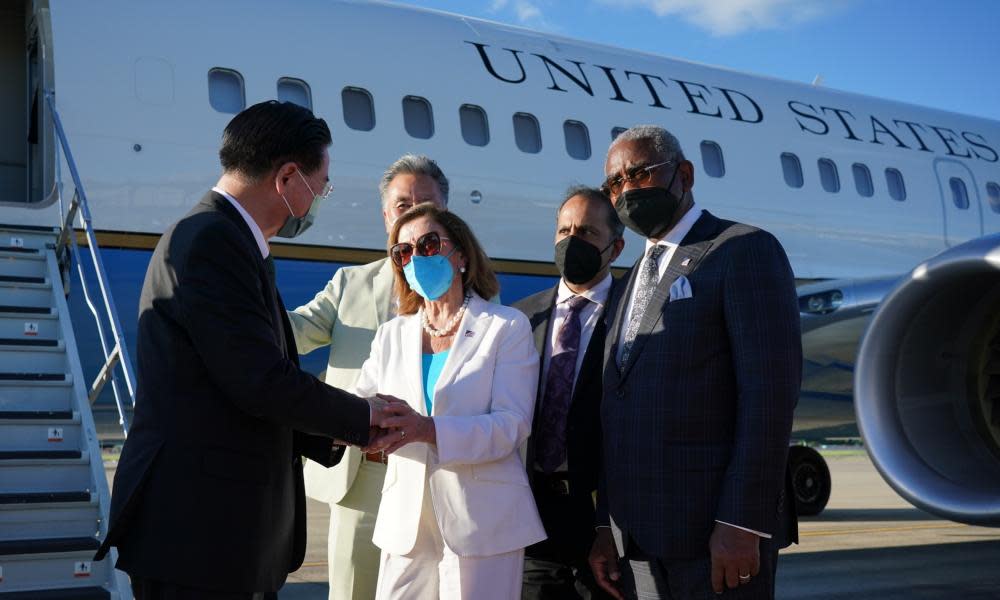Pelosi’s Taiwan trip could have significant consequences for global economy

Relations between the US and China were poor even before the visit of the House of Representatives speaker to Taiwan. Now they have the potential to turn very nasty indeed – with significant consequences for the global economy.
At the moment, things look containable. Financial markets have responded relatively calmly to Nancy Pelosi’s visit and the military exercises that Beijing has ordered in response. The assumption is that China will put on a show of strength and leave it at that.
However, its president, Xi Jinping, also has economic and financial weapons at his disposal and may choose to use them. At the milder end of the spectrum, China could make it more difficult for US companies to access its market. It will be in no hurry, for example, to allow Boeing to resume sales of its 737 Max planes.
This would accelerate the decoupling of the world’s two biggest economies – a trend that began when Donald Trump was in the White House and has continued under Joe Biden. Hostility towards Beijing is one of the few things Republicans and Democrats agree on.
There is the risk, though, that China could go further and exploit Taiwan’s dependence on imported fuel by imposing a blockade on the island. As Mark Williams, the chief Asia analyst for Capital Economics, notes, this would soon cripple Taiwan’s industry and cause “huge global economic disruption”.
That is because the island manufactures roughly half the world’s semiconductors, used in everything from mobile phones to cars and already running short. Restricting the export of chips would lead to supply bottlenecks, higher inflation and weaker growth. Inevitably, there would also be pressure on the US not only to impose economic sanctions and asset freezes but to intervene militarily as well.
Financial markets are probably underestimating the risks posed by Taiwan. At the very least, business confidence is going to take a fresh hit. The chances of tit-for-tat trade restrictions have increased. There will be more pressure for national self-sufficiency to reduce dependency on global supply chains.
And that’s a relatively optimistic reading of events. There is clearly a risk – low but non-negligible – of this increasingly tense cold war turning hot.
Oil prices appear to have further to fall

There was a time when meetings of the oil cartel Opec were front-page news. When Sheikh Ahmed Yamani died last year, the obituaries made much of how, as Saudi Arabia’s petroleum minister, he was a pivotal figure in determining the global price of crude.
But that was all a long time ago. Opec is now Opec+ thanks to the addition of some new members, including Russia, but it no longer wields the influence over global energy markets it had in the 1970s and 80s.
Oil prices are now well down on the levels they reached in the immediate aftermath of Russia’s invasion of Ukraine, and will probably fall further in the coming months. That has nothing to do with Wednesday’s meaningless decision by Opec+ to increase the supply of crude by 100,000 barrels a day and everything to do with global demand.
As the International Monetary Fund noted last week, all three of the world’s major economies – the US, the eurozone and China – are stalling. Oil is trading at about $100 a barrel – a price consistent with strong global growth rather than the recession that is looming this winter.
Whether or not Opec+ adds to the downward pressure by increasing production, oil prices look to have further to fall. That will be good news for UK motorists, provided of course the lower costs are passed on to them by the petrol retailers.
Why regional pay for public sector workers is a duff idea
Setting up regional pay boards to match the pay of public sector workers to local labour market conditions is the sort of proposal Liz Truss might have dreamed up when she was cutting her political teeth as the deputy director of the centre-right thinktank Reform.
Nothing wrong in that. Thinktanks are there to come up with radical new proposals. Politicians, though, have to separate the good ideas from the duff ones, and regional pay for public sector workers falls squarely into the latter category.
There are reasons for that. One is that cutting public sector pay would reduce spending power in parts of the country that suffer from low levels of demand. Another is the need to provide incentives for the brightest and the best to take up jobs outside London and the south-east. The proposal is bad economics and bad politics, which jars with the government’s levelling up agenda. No wonder Truss dropped the idea within 24 hours of announcing it.


